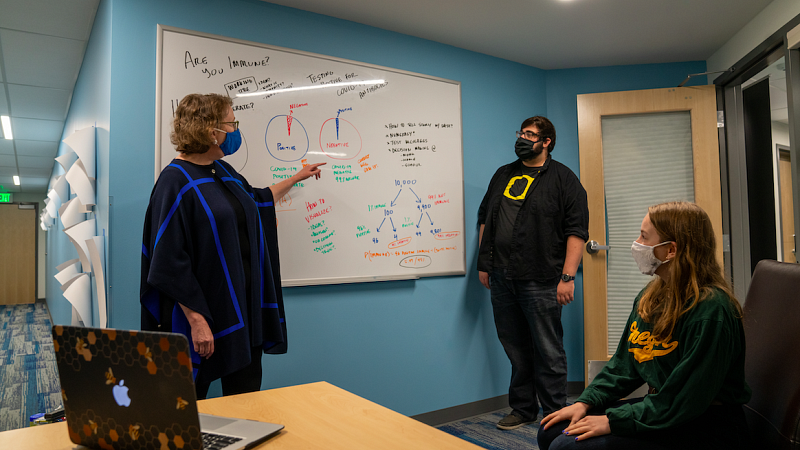
The coronavirus pandemic shifted many elements of our lives, including how we talk about and understand risk. As University of Oregon communicators worked to share emerging risks and regulations to the campus community, they tapped into top researchers on the UO faculty for evidence-based advice.
In July 2020, Center for Science Communication Research director Ellen Peters wanted to help the university provide clear communication around COVID-19 on campus and beyond. She reached out to13 other faculty members from departments across campus to form the UO Faculty Engagement Team (FET) to develop communication strategies that would help slow the spread of COVID-19.
The majority of faculty members on the team are from the School of Journalism and Communication (SOJC), but it also includes faculty and staff from the Department of Psychology, the Lundquist College of Business, University Health Services and Clark Honors College. Peters said the research could be observed from many different angles because science communication is such an interdisciplinary field.
“The idea of having people from across departments was to pull together not a subset of our strengths at UO, but a larger set of our strengths,” Peters said.
The team primarily assists UO Communication with student messaging around COVID-19, but they have also partnered with Lane County and City of Eugene communications. Most of the time, these groups come to the FET seeking communication assistance, but the team offers help wherever they can.
FET member Autumn Shafer, a health communication expert and public relations associate professor in the SOJC, said she noticed opportunities to promote the UO Monitoring and Assessment Program (MAP) testing center. As a result, the team provided messaging strategies to UO MAP to get more students enrolled in testing.
“Our first meeting was about how do we get people to wash hands and wear masks,” Shafer said. “So it's kind of evolved as the needs of the pandemic have evolved.”
The FET was highly involved in a project called the Crush COVID-19 Challenge. The app encourages students to engage in protective behaviors against the coronavirus. Maxwell Foxman and Amanda Cote, two SOJC media studies professors with expertise in gamification, were brought onto the FET to offer advice about what would make students more likely to use the app.
Peters said when you’re trying to get people to do something with repeated behaviors, such as getting tested regularly and going to multiple vaccine appointments, gamification works well because it incentivizes people to come back over and over again.
While the FET offers feedback to any entity looking to improve their communication, the team focuses on what theory and research suggest are the best messages for reaching the 16- to 25-year-old age group.
“We do this to try to benefit the community at large. If we can't manage to keep this down and get past this, we're going to have variants mutating, and then it may get worse for everybody,” Peters said. “But in the short term, it's going to be problematic for a lot of people who are older, sicker, etc.”
As the FET shifts its messaging strategies from testing, social distancing and handwashing to getting vaccinated, health communication experts such as Shafer will be drawing on previous research on the best ways to combat vaccine hesitancy.
“It is so exciting as a scholar to hear from people in other disciplines and be able to just talk back and forth and problem-solve together,” Shafer said. “It's sort of like a relay race: someone is passing the baton of knowledge, and everyone has their specialties. But when we're all working together, we're able to get around the track.”
— Joanna Mann, class of '21
Joanna Mann, class of ’21, is a journalism major in the SOJC and a writer for the SOJC Communication Team. She is a senior news writer for the Daily Emerald covering the UO Senate, Tuition and Fee Advisory Board and other general news around Eugene. She interned at Eugene Weekly in 2020, where she wrote news and features on the arts & culture world of Eugene.
